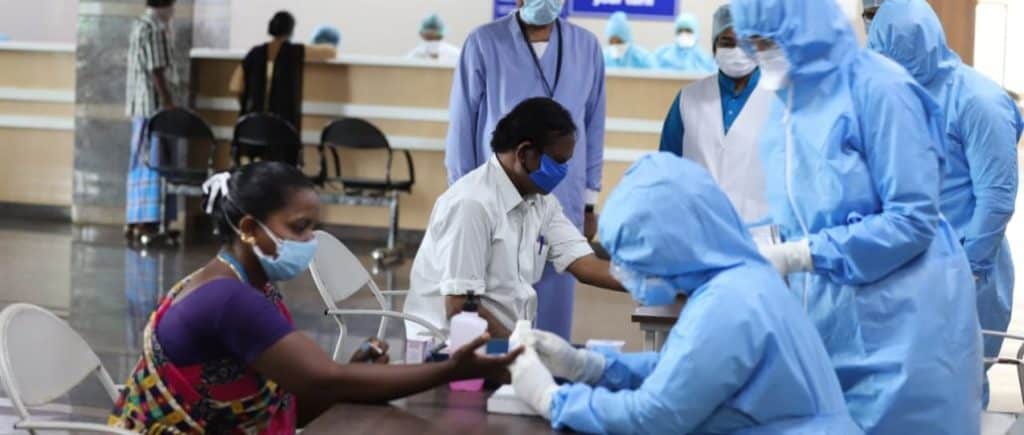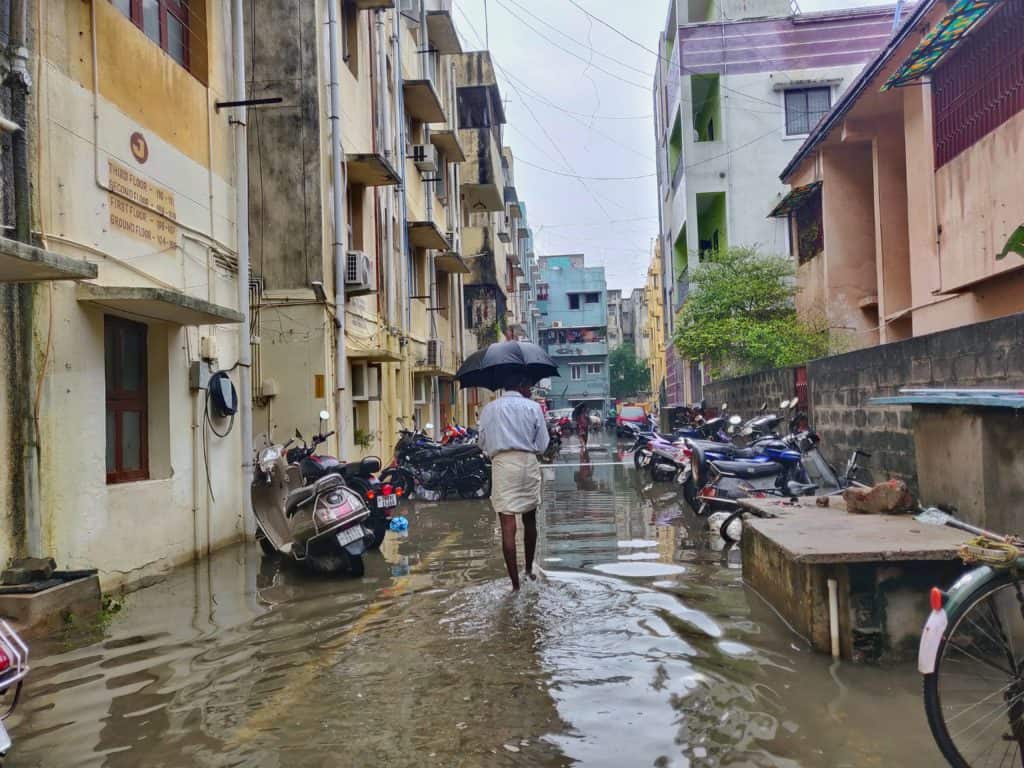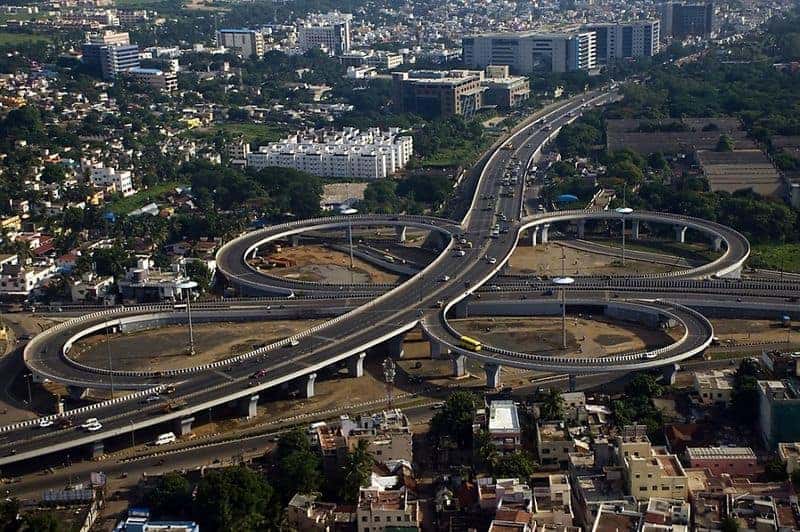As 2021 drew to a close, Chennai appeared to be reliving the dominant highlights of the year that just passed us by – rains and COVID-19 (in its new manifestation through the Omicron variant). Just as Chennai was recovering from the extreme rainfall that lashed the city in November, the city was taken by surprise as another very heavy spell of rain on December 30th brought it to a standstill.
On the other hand, the city is also witnessing a rise in COVID cases yet again, with 397 cases being reported on December 30th alone. The Government of Tamil Nadu had imposed restrictions in the state capital with regard to New Year celebrations in hotels and other public places, citing an increase in positive cases in the state.
For Chennai, 2021 was nothing short of a rollercoaster ride. It started amid the pandemic-induced lockdown, witnessed a change of government after a span of a decade, saw several new developmental projects take off, some of which were welcomed by citizens while some met with heavy criticism. Later in the year, students returned to the classrooms after a hiatus of more than a year. The city’s very own CSK brought some cheer by regaining the IPL title in October but the heavy rains in November, which brought back devastating memories of the 2015 floods, eclipsed that, raising serious questions over climate preparedness as well as environmental governance.
As we enter the new year, we take a look at some of the most notable happenings in the city over the year past, and how Citizen Matters Chennai tracked the same.
Chennai rains
For residents in several parts of Chennai like T Nagar, Velachery and North Chennai, it was a deja vu moment, when the city was hit by heavy rain in November 2021, causing severe inundation and flooding in several areas, with water entering many houses. Although Chennai received nearly 5 to 6 times more rainfall than the average on the occasion, questions were raised regarding the role played by illegal constructions and encroachments as well as the lack of a proper underground drainage system which is said to have worsened the situation.
As the city struggled to cope with the devastation and inundation created by the rains, we delved deeper into the problems faced, the reasons behind the same, and what could be potential solutions. You can read more about these in the following reports:
- Chennai rains: The real reasons why urban floods are a never-ending problem in the city
- In Chennai’s resettlement colonies, life comes full circle with the floods
- Chennai floods: How these Mandaveli streets averted waterlogging even as it poured
- Flooding in T Nagar raises a lot of questions for the smart city mission
- Four recommended steps for a flood-proof Chennai
Pandemic year continues
It wouldn’t be too far from the truth to say that 2021 was a continuation of 2020, which is known as the pandemic year. Chennai stepped into January 1, 2021 exactly a year ago, with 2,528 active cases of COVID-19 and with the total number of positive cases in the city at 2,25,758. Following the assembly elections in the state in May, the newly elected DMK government under MK Stalin announced a complete lockdown starting May 10th, in the face of the devastating second wave.
The lockdown was initially announced for a period of two weeks but was further extended until the government started lifting it partially from June onwards, when the cases started to decrease.

The role played by the bureaucrats and officials at the Greater Chennai Corporation (GCC) in tackling the pandemic was widely appreciated.The city’s administrative body took various measures: ramping up testing, arranging for telephone consultations and car ambulances, providing medical kits to those undergoing home isolation and so on.
As the year came to an end, the number of active cases in the city stood at 1,689 as of December 29th. Here are some of our reports from last year that looked closely at the pandemic and its aftermath, and which may hold important guidance for 2022.
- The second wave: All about the latest COVID testing, containment and vaccination protocol in Chennai
- Not just a supply crunch: The real reason why patients in need of oxygen are suffering
- With close to 50000 active cases, why is Chennai unable to ramp up vaccination?
- Dengue in the time of COVID: Stiff challenge ahead for Chennai’s civic and health workers
It has been reported that Chennai is lagging behind other southern capitals as far as the second dose of COVID-19 vaccinations are concerned. As per a report in The Times of India, only 63% of the city’s eligible population received both doses of the vaccines as of December 15th, while the other three south Indian state capitals have vaccinated more than 70% of the eligible population.
Governance and infrastructure development
The state of Tamil Nadu went to polls in April 2021, which saw the DMK-led alliance return to power after a gap of 10 years. The ruling alliance also stamped its authority over the state capital by clinching all of the 16 assembly constituencies in Chennai. Shortly after the DMK government took up the reins, it announced a proposal to revive the Singara Chennai project of the late nineties.
The year also witnessed the formation of the Tambaram Corporation, upgrading the municipalities of Pallavaram, Sembakkam, Pammal and Anakaputhur, and neighbouring town panchayats like Madambakkam, Thiruneermalai, Perungalathur, Chitlapakkam and Peerkankaranai. This evoked mixed reactions from residents of the mentioned areas. Residents of areas which are comparatively better developed wanted a merger with the GCC while those from less developed areas were happy with the creation of a new Corporation.
Another notable development of 2021 is the whopping $150 million approved by the World Bank as part of the Chennai city partnership project (CCP), to assist the Tamil Nadu government in transforming Chennai into a world-class city. This project aims to make Chennai more green, livable, competitive, and resilient to climate change and other shocks.
The other notable development this year was the inauguration of the Urban Square under the Kathipara flyover, which had been in the works since 2013. The city has also witnessed several beautification works the past year including painting of MRTS and suburban railway stations, renovation of parks and pavements and so on. However residents have often complained that some of these beautification works were a waste of taxpayers money and instead could be used to improve or construct facilities that are lacking, for example: storm water drains.
At Citizen Matters Chennai, we looked at some of these developments through the lens of the various discussions and debates they sparked:
- Government should not use slum eviction to further ‘Singara Chennai’ agenda : Migration expert
- Tambaram has a new Corporation, but not all residents are happy
- What the World Bank’s Chennai City Partnership project aims to achieve
- What is needed to make the Rs 500-crore Singara Chennai 2.0 a success
- Chennai Metro’s Kathipara urban square project: What citizens can look forward to
Transportation
Chennai has always been lauded for the range of public transport services it offers. Keeping this in mind, the World Bank this year has said that one of its goals as part of the CCP project is to operationalise the Chennai Unified Metropolitan Transport Authority (CUMTA), which was the brainchild of the DMK government in 2010. The idea behind such an agency is overall supervision and coordination of the activities of the various agencies involved in the planning and operation of the transportation system in the city. With the DMK government back in power, this project is expected to take off in the coming year.
Overall, it’s been a mixed year for the public transport system as a whole in the city, which is still reeling under the effects of the pandemic. As far as the Chennai Metro is concerned, although the work for its Phase 2 is taking place at a rapid pace, the urban rail system is still struggling to meet its daily proposed ridership.
Similar is the case with the Metropolitan Transport Corporation buses and the suburban trains, which, according to reports, are running short of the number of services in the areas where they are needed the most or have seen a dip in patronage in certain areas. Experts feel that an agency like CUMTA can improve the situation of public transport in Chennai.
Here are some of our top stories that tracked urban mobility and related issues:
- Will CUMTA finally get going with a push from the World Bank partnership?
- Why Chennai’s suburban rail passengers are struggling to get their voices heard
- Why don’t we see electric buses on Chennai roads?
- How does MTC decide bus routes in the city?

